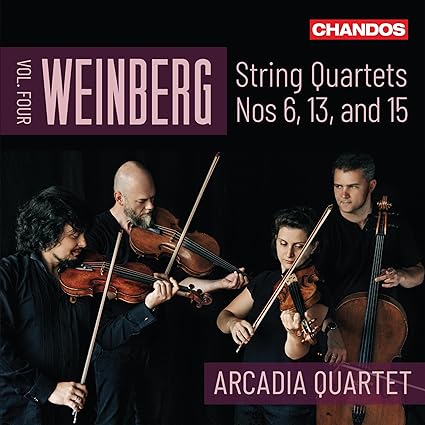

Mieczyslaw Weinberg (1919-1996): String Quartet No. 6 in E minor, Op. 35 Mieczyslaw Weinberg (1919-1996): String Quartet No. 13, Op. 118 Mieczyslaw Weinberg (1919-1996): String Quartet No. 15, Op. 124
This release, 4th in a continuing series of the complete Weinberg string quartets, maintains the superlative standards of the previous releases, both in recording and playing, and rewards the concentrated focus the music's somber brilliance demands.
It is good news that Weinberg's music has been receiving more attention in the last 10 years, that recognition is deserved. Like many I suspect, I first came to the music of Mieczyslaw Weinberg by way of his near contemporary, semi-mentor and close friend Dmitri Shostakovich. They share several musical elements, certainly a deep seriousness, as well as a focus on their symphonies, string quartets and solo piano music for some of their most thoughtful and heartfelt compositions. Their music would not be the first coming to mind if one looked for a carefree spirit, as they both lived through the cataclysmic events of World War II and the intense pressures of an artist living under Stalin in Soviet Russia. Their music is often of the very highest level of achievement and emotional communication.
Having said that, Weinberg is no mere Shostakovich version 2. Weinberg was Polish and Jewish, escaping to Soviet Russia just ahead of the Nazi invasion of Poland in 1939 and then further into Russia after the Nazi invasion of that country in 1941. He lost most of his family members in the Holocaust and faced anti-semitism in many aspects of his life, at one point being imprisoned (effectively typically a death sentence for a prisoner of Stalin). His music often reflects his Jewish heritage quite directly. Being originally Polish, he was effectively an émigré for most of his life, and while his childhood home in Warsaw miraculously remained standing during the war (despite being a part of the Warsaw Ghetto), very little else of the city of his birth remained. Much of his music reflects the impact of World War II, a focus again shared with Shostakovich. They remained close friends throughout Shostakovich's life, Weinberg's 12th symphony being dedicated to Shostakovich on his death in 1975.
This release displays the remarkable freedom of form with which Weinberg approached the string quartet genre. The 6th quartet is in 6 movements, the longest being the first. The 13th is in a single movement, and the 15th is in nine movements.
From the start the 6th displays a flowing momentum, for example in the first movement (the longest of the quartet), rising to a frenzied almost frightening climax near the middle. There have been at least two other recorded cycles of these string quartets, by the Silesian Quartet and the Quatuor Danel. Both are also excellent, but I find this movement stands out in the Arcadia's performance above all others. This wonderfully swirling music moves through 2 faster movements, and then the thoughtful and pensive canonic adagio, through to the undulating outbursts and introspection of the final two movements. It's a very affecting work, given the 'honor' of being banned in post WWII Soviet Russia. The Quatuor Danel are thought to have given its public premiere in 2007, long after the composer's death, so their cycle as a whole deserves a lot of attention also, but I could feel the high level of emotional expression from the Arcadia Quartet in this release under review.
There follows the one movement 13th Quartet, written shortly after the death of Shostakovich. In a way, its introspective mood is the private antithesis of his great public outpouring of his 4 movement Symphony No. 12 also written as a memorial to his great friend. Although in one movement, shifting through several changes in motion, it is linked by the overwhelmingly sad opening theme that reappears in a cry of pain at the end.
Finally, the 15th quartet, in many ways the most tonally forward looking, and formally different with 9 movements, many of them short. The 3rd movement for example sounds atonal, and yet the creative use of string glissandi are intriguing. It's the most challenging of the three works to hear first time, on its own at least. But when heard in the context of the other works on this disc, and in the whole quartet cycle, it can be seen as the work of the same person.
We are unbelievably lucky to have three wonderful cycles of these quartets on record, not forgetting the Pacifica Quartet's 'Shostakovich and his contemporaries' cycle which includes the Weinberg 6th quartet as well and shows the composer within a whole 'Soviet Experience' context. All these performances have great merit, and with all the recording qualities are of a high order. The current release has given me enormous, almost unexpected enjoyment, and I thoroughly recommend it to all listeners open to exploring its intense sobriety.
The excellent detailed accompanying notes in the booklet are written by David Fanning, an acknowledged expert in this period and this composer. They make a valuable addition to the overall experience.
Ian Orbell - July 2024 Quartet No. 6 - Opening Movement